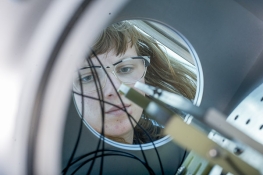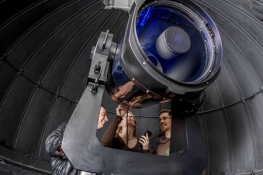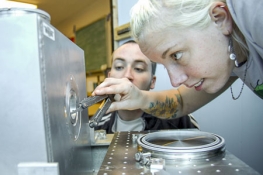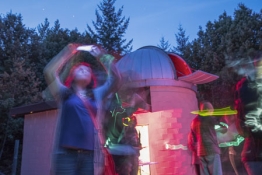Careers & Alumni
With a strong foundation in research, hands-on experimentation, and problem solving, you’ll be highly prepared for your future in a STEM career.
A Physics degree can be applied in a wide variety of industries and career paths.
The B.S. in Physics is designed for those students who expect to enter one of the various fields of research and development in government or private industry. The curriculum, in addition, serves those students who are interested in continuing into graduate study and those preparing to teach at all levels. The B.A. degree in Physical Science is less specialized and more adaptable to studies in various fields, including preparation for teaching at the secondary school level.
Our graduates have gone on to tackle some of the most profound research topics in fundamental physics and astronomy, and others are leaders in emergent industrial technologies. Places that our recent graduates currently work include the NASA Goddard Space Flight Center, Hewlett-Packard, the LIGO Gravitational Wave Observatory, and Thermo-Fischer Scientific, Inc., to name just a few.
In recent years, our graduates have pursued Ph.D. degrees at the University of Colorado, Montana State University, Rutgers University, the University of Washington, and many other programs throughout California and beyond (including international graduate programs). Through the Knight Campus for Accelerating Scientific Impact at the University of Oregon, several graduates have earned M.S. degrees with immediate placement in industrial careers focusing on semiconductor and optical systems technology.
The American Physical Society and the American Institute of Physics have large amounts of data concerning salaries and career trends and opportunities for Physics and Astronomy majors. For example, starting salaries in the private sector can range on average from around $60,000 for Bachelor’s degree recipients to over $100,000 for those with a Ph.D. The median wage for Physicists and Astronomers in 2020, according to the Bureau of Labor Statistics, is $129,000.
Related Job Titles
The following list is not meant to be all inclusive; many other job alternatives and titles may exist. Many of the job titles listed require further education.
- Physicist
- Astronomer/Astrophysicist
- Secondary science teacher
- Scientific Programmer
- Physical Oceanographer
- Physical Chemist
- Geophysicist
- Biophysicist
- Medical/radiological technologist
- Telescope operator
- Staff Scientist (Industry, University, or National Laboratory)
- Financial Analyst
- Materials Scientist
- Semiconductor Engineer
- Renewable Energy Scientist/Engineer
- Nuclear engineer
- Fusion Engineer
- Optical Systems Specialist
- Climatologist
- Aerospace Scientist/Engineer
- Electronics Engineer
- Systems Analyst
- Statistician
- Patent Examiner
- Scientific Writer/Editor
- Museum Technician/Curator
- Laboratory Assistant
- Technical Consultant














